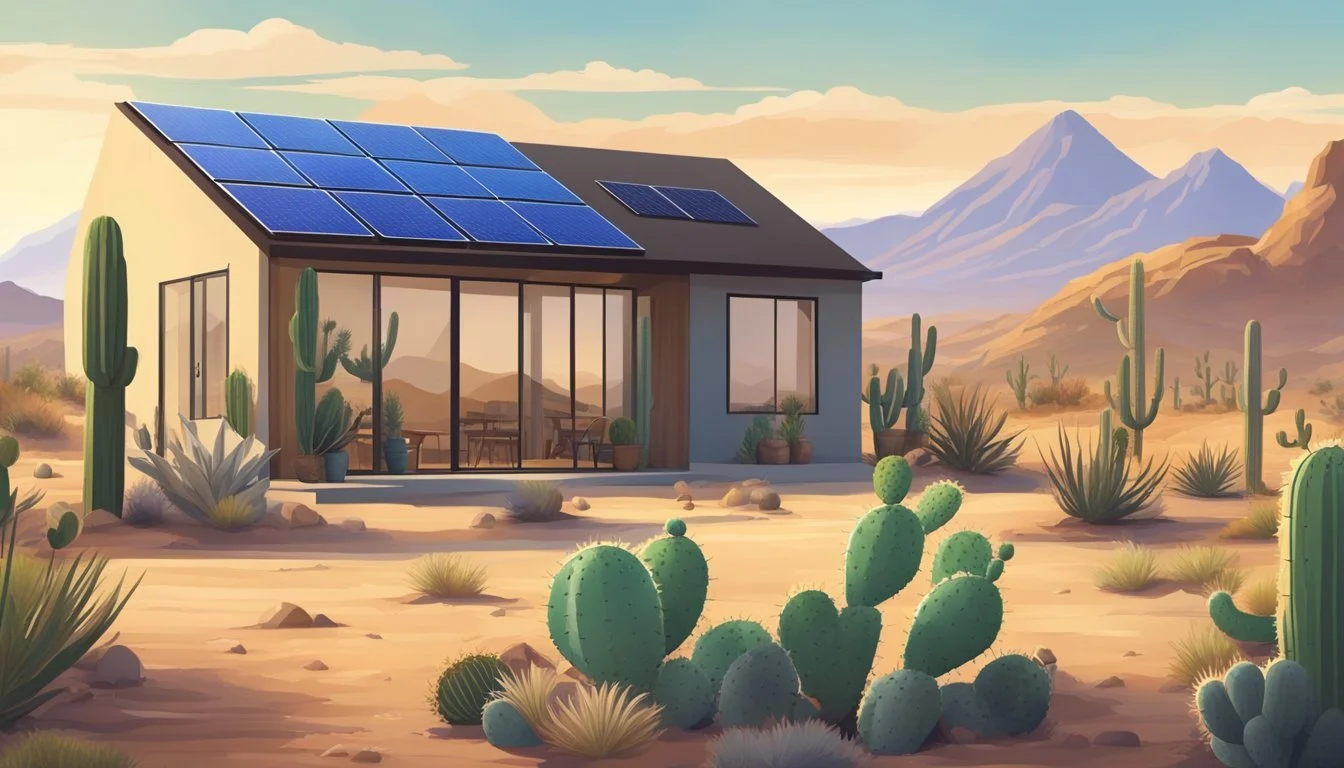The world-popular Grand Canyon State is famous for its impressive landscapes, burning summers, and being a perfect place to “trap” sun energy. Being cuddled by the vast expanse of the southwestern sky, Arizona serves as a limitless beacon of untapped solar potential. The state’s benefits of using solar power are theoretical and brilliantly practical.
Arizona has an amazing abundance of sunlight, with more than 300 days of sunshine yearly. This constant sunshine, combined with vast and flat terrains and minimal cloud cover, makes Arizona a prime location for solar power generation and is already giving you a hint to the main question – is solar worth it in Arizona?
After everything written above, it becomes evident that the synergy between the state’s climate and solar energy potential results in limitless opportunities for Arizonans for affordable electricity.
In this article, we will explore countless benefits of using solar power in Arizona, delving into societal Arizona energy pros – is solar worth it in Arizona? Besides social and environmental advantages, we will research economic issues, such as the cost of solar panels in Arizona, the cost of electricity in Arizona, the average monthly payment for solar panels, the average electric bill in Phoenix, how much solar energy costs, solar cost per kWh, etc.
We will also analyze Arizona solar installers and the best solar companies in Arizona. And, of course, we will not forget to examine and highlight the back sides of converting solar in Arizona and some specific things for Arizona consumers to be aware of when going through the solar process.

What Is the Average Cost of Solar Panels in Arizona?
Have you already noticed a serious boost in electricity rates? The growth of 8.1% throughout the state between 2022 and 2023, plus the hot climate – stimulates people to go solar, and requests all over the internet of type “Is solar worth it in Arizona?” are getting more and more frequent. The average electricity bill in Arizona has risen by about 6% between October 2020 and October 2021. At the same time, the Solar Energy Industries Association (SEIA) reports that the equipment for solar energy has become more affordable by about 52% in the Grand Canyon State over the last decade—a perfect time for Arizonans to make the switch to solar energy.

Year-Over-Year Percent Change in Average Residential Electricity Price, October 2020 – October 2021
Arizonans are expected to pay an average price of $2,53 per watt for solar panel installation or $15,180 for an average-sized 6 kilowatt (kW) solar system. This cost is lower than the national average of $3.27 per watt, as reported by the Solar Energy Industries Association (SEIA). Here, at this price, comes installation but does not include possible cost-saving credits from federal, state, and local incentives. Solar panels qualify for a 30% federal solar tax credit nationwide, and Arizona offers an additional 25% tax credit up to a maximum amount of $1,000.The state also provides sales and property tax exemptions for solar panels.
In most Arizona locations, solar panel systems produce over 1,800 kWh annually, according to the World Bank Global Solar Atlas. For example, if you live in Phoenix and will install a 5 kW system you can expect panels to generate over 9,000 kWh of energy annually.
U.S. Energy Information Administration claims that the average utility bill in Arizona is 13.11 cents per kWh. If your panels create 9,000 kWh of solar energy, you can save $1,180 per year on electricity expenses. The typical 5 kW solar system costs $8,855 after tax incentives, providing an annual ROI (return on investment) of nearly 13%. Therefore, your panels could pay for themselves in energy savings in 5.3 years.
Over the next few decades, Arizonans’ and Americans’ expenses for installing solar panels should continue to decline. By 2030, the Department of Energy intends to cut the cost of solar energy in half, making the investment easier and reducing the time it takes to recover installation costs.

What Goes Into the Average Price of Solar Panels in Arizona?
Solar System Size
Usually, before installation, the company you choose performs a site assessment to determine the size of your solar system to cover your energy needs.
The cost of your solar system depends on number of panels you need to power your house. Your solar panel will produce more energy here than in other states because Arizona gets a lot of sunshine. Shade, wiring, and inverter efficiency costs must be considered since no system is 100% efficient.
Panel Type and Brand
The solar panel type you select will also have an impact on project expenses. Although they cost more, monocrystalline solar panels are more effective at converting sunlight into electricity than polycrystalline ones. Premium solar panels with 25-year guarantees from prominent manufacturers will cost more.
Installation Company and Complexity
Your total solar expenses can be significantly influenced by local labor rates and the solar installer you choose. Labor and installation fees account for a fraction of the overall cost of your solar system; solar panels, inverters, and other equipment only make up about 47% of the total. For instance, if the intricate shape of your roof makes installing solar panels more challenging, you should budget more. Due to higher overhead, large solar companies typically charge more for installations than smaller, local businesses.
Financing Options

Maintenance Costs
Solar panels are durable and low-maintenance. If dust and other particles that impede sunlight are removed, high-quality modules can generate electricity for decades.
Annual solar energy system maintenance costs are usually less than 1% of its initial cost. Some solar providers offer free cleaning for a limited time after installing your panels.
What Financial Incentives Exist in Arizona?
To motivate citizens to switch to renewable energy sources, the majority of states provide solar incentive programs. Let’s delve into the following incentives more deeply:
Federal Solar Investment Tax Credit (Itc)
Residential solar panels purchased and installed by December 31, 2032, are eligible for the 30% Federal Solar Tax Credit (ITC). Arizonans who install solar panels have been allowed to take gain of the ITC since its creation in 2005, but the credit has undergone various alterations since then. Most recently, in August 2022, thanks to the implementation of the Inflation Reduction Act, the tax credit was increased from 26% to 30% of the system value.
The following pricing schedule will apply to the ITC:
- 30% of your total system value for solar photovoltaic (PV) systems erected between 2022 and 2031;
- 26% percent of the total system value for solar photovoltaic (PV) systems installed in 2032;
- 22% of your entire system value for solar (PV) systems installed will account installed in 2033;
Credit for systems installed beginning in 2034 is terminated unless Congress extends it once more.
Residential Solar Energy Tax Credit
Solar energy systems in Arizona get a tax credit equivalent to 25% of their value or $1,000, whichever is less. Your system must either be installed on land you own or lease, and it must have a minimum capacity of 5 kW. When you file your taxes within the year your system is installed, credit is applied.
Solar Equipment Sales Tax Exemption
Arizona’s 5.6% sales tax does not apply to solar panels, so purchasing equipment now will save you money right now. It includes lithium-ion batteries and is accessible to both commercial and residential users. If individual tax codes do not clearly state otherwise, the exemption does not apply to additional sales taxes levied by cities.
Energy Equipment Property Tax Exemption
After solar panels are installed, any rise in the value of a home in Arizona is not subject to taxes. You will, therefore, continue to pay property taxes for a $400,000 home even if your solar power system raises the value of your $400,000 Arizona home to $430,000
Net Billing
Since 2009, Arizona net metering has been implemented. A decision to switch from net metering to net billing was taken in 2016 by the Arizona Corporation Commission (ACC). Accordingly, energy exported to the grid by new customer-generators is rewarded at an avoided cost rate.
Through the program, you can receive credits for any extra energy your solar panels create. You can return excess energy produced by your solar panels to the utility grid in order to receive credits toward future electricity bills, should you need more energy than your home requires. You can carry over the balance to the following month if there is a billing period during which your solar credit is greater than your electricity expenditure.

Source: texasrealfood
Your solar capacity cannot be greater than 125% of the total energy used by your equipment or your connected load in order to be eligible for this rebate. Your utility provider will determine the exact amount per kilowatt-hour that you will be compensated for any excess energy that your solar panels produce.
There are three largest utilities in the state, and their rates are as follows:
- Arizona Public Service (APS): 10.45 cents per kWh
- Tucson Electric Power (TEP): 8.68 cents per kWh
- UniSource Energy Services (UNS): 10.35 cents per kWh
What Should Arizonans Be Aware of When Considering Going Solar?
While determining whether solar panels are a good investment for your house is a significant first step toward switching to clean energy, there are a few more things to think about along the way. We’ll go over a few things to consider if you want to convert to solar power in Arizona.
- Upfront fees: The initial costs of a solar panel system are always important to take into account, particularly in a place like Arizona, where high energy use necessitates enormous, pricey solar arrays. Reduce your upfront costs by installing the least amount of equipment possible, usually by eschewing solar batteries and other add-ons; select less expensive manufacturers of solar panels; and obtain a zero-down payment solar loan. Again, while the lack of upfront costs associated with solar leasing may make them sound alluring, financing or purchasing your equipment is nearly always a better option.
- Payback period: Every household should calculate or have a local solar provider estimate the time it will take their panels to pay for themselves. The solar panel payback period indicates how worthwhile solar will be for your home and how high your ROI will be. Arizona has an average 11-year payback. Your ROI will be smaller, and savings will take longer if yours is longer.
- Policy and incentive changes: Although the use of solar energy is already rather widespread in Arizona, it is still growing in popularity. The incentives, subsidies, and solar laws, including net metering, are susceptible to change as the relatively new industry evolves and gets better. Things in Arizona, a solar-forward state, are probably going to get better eventually. Even if waiting for higher incentives is not a good idea, you should check for policy updates before switching to solar power.
- Climate conditions: Arizonans rarely worry about the weather while installing solar panels because most days are sunny and efficient. Many homeowners worry about their solar panels during the rainy season, but choosing a supplier with a strong physical protection warranty will rest their minds. Your panels’ efficiency can dip below 10% on rare wet and cloudy days, but the rain will naturally wash dirt and debris off, improving efficiency during sunny weather.
- Leases vs. PAAs companies’ offers: Last but not least, you should look out for companies that offer “free panels,” solar leases, or power purchase agreements. The low initial cost of leasing solar panels makes it appealing, but in the long run, it doesn’t save as much, it is not eligible for the federal tax credit, and it doesn’t increase the value of your house. Before you hire a solar installer for your home solar project, find out about the company’s reputation, level of customer service, and vetting process.
What are the Top 3 Arizona Solar Companies?
Based on their reputation, cost, panel performance and selection, and customer feedback, we suggest the following companies if you’re prepared to look for a solar provider.
- SunPower:
In addition to creating its own solar storage system and microinverter technology, SunPower is renowned for producing highly efficient solar panels. More than the average product coverage for the solar business, the company offers a 25-year warranty for both labor and equipment. There are three ways that customers can finance their systems: lease, loan, or upfront purchase. At present, SunPower holds an A+ rating* with the Better Business Bureau (BBB) and is primarily rated positively by customers.
- Blue Raven Solar:
One of the best Arizona solar companies is Blue Raven Solar. It provides a two-year power production guarantee in addition to a 25-year warranty on monocrystalline panels from multiple manufacturers. Customers can finance their systems with Blue Raven via a solar loan or by paying in full at the time of installation. The supplier also has excellent client feedback and an A+ BBB rating.
- Tesla Energy
Tesla sells high-tech solar equipment in addition to cars. Tesla Solar sells monocrystalline panels and flat-roof solar shingles for a more discreet look. Tesla has an A+ BBB rating and generally good customer ratings. Upfront cash purchases and solar financing are alternatives
In general when choosing Arizona solar company or any other state, there are several crucial moments to remember and take into consideration:
- Solar equipment, installation, and services
- Warranty and performance guarantees
- Brand reputation and certifications
- Financing options
- Experience
- Availability
Conclusion
Arizona has plentiful sunshine, tax incentives, and a favorable net metering regime, making solar panels a good investment. With government incentives, a 10 kW residential solar system in Arizona costs $17,710, down from $25,300. If positioned in Arizona’s best sunlight, your panels can create over 18,000 kWh per year. A 10 kW solar system can save you over $2,000 per year than regular electricity, or over $50,000 over 25 years.
In Arizona, choosing to switch to solar energy is not a simple option. The financial benefits of leasing, PPAs, paying cash, and taking out a loan would differ depending on the specific circumstances. Furthermore, the ongoing efforts by one business to retaliate against the other may make matters more difficult. Ultimately, solar energy will, at the least, result in financial savings and a sense of accomplishment because it uses the sun’s energy to power your home’s electrical systems, saving 106 trees annually. You may make a wise choice that will benefit you for many years to come by carefully analyzing your local energy rates together with any payments you will have to make on your system. We hope that we have fully answered your main question – Is Solar worth it in Arizona?


